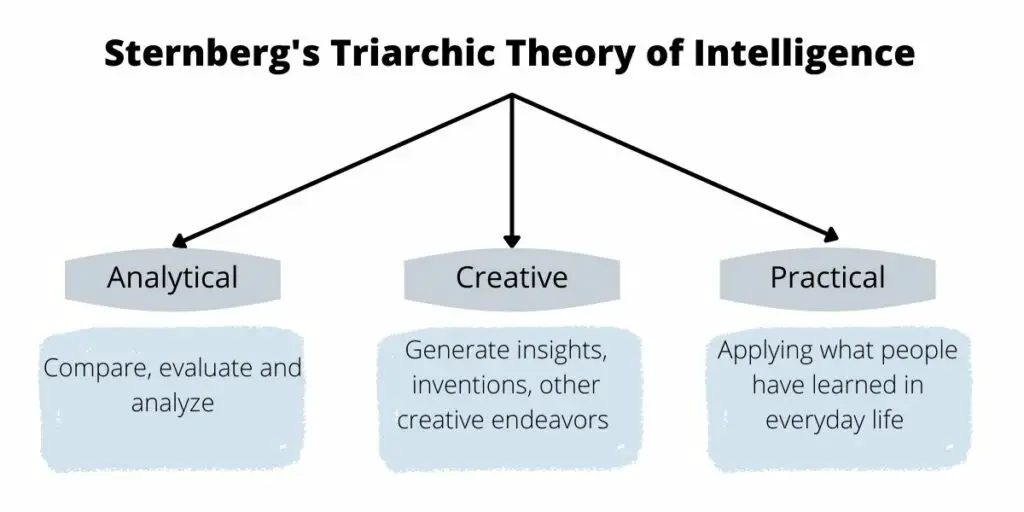Disclaimer: We sometimes use affiliate links in our content. For more information, visit our Disclaimer Page.
The term “practical intelligence” may be new to you. But it is the foundation of success in life. Practical intelligence, or pragmatic thinking as it is sometimes called, encompasses a set of necessary skills for day-to-day living in our modern society.
People with high practical intelligence can use their skills sensibly and live more productive lives than those who lack these abilities. But what is practical intelligence, and how can it be improved? In this blog post, we’ll explore the practical intelligence definition and offer tips on improving it.
What is Intelligence?
Perhaps one of the most intriguing aspects of intelligence is so many varying opinions on it. For example, some psychologists argue that intelligence encompasses various skills, aptitudes, and talents, while others view this as a single overarching ability.
Merriam-Webster defines intelligence as “the ability to learn or understand or to deal with new or trying situations.” But what does that mean? Intelligence is a complex character of cognition. Many theories have been developed to explain intelligence and how it works.
How does the Concept of Intelligence Develop?
A German psychologist named William Stern invented the intelligence quotient or IQ score early in the 20th century. Shortly after that, another psychologist from France (Alfred Binet) made an important discovery when designing the first standardized test to identify students who needed more academic help.
There are many varying theories of intelligence to explain the concept. Some examples include Charles Spearman’s idea of general intelligence, and Louis L. Thurstone’s theory on primary mental abilities; however, we’ll be reviewing Sternberg’s Triarchic Theory in this article because it has been more widely accepted and studied over time as a result there are significantly more resources available for review than other similar models which have only recently gained popularity (Howard Gardner).
This article will delve deeper into his Triarchic Theory, which encompasses three types: analytical skills, creativity-practical intellect, and wisdom-emotional comprehension. (Analytical Skills – Creativity/Practical Intellect – Wisdom).
What is Sternberg’s Triarchic Theory of Intelligence?

The Triarchic Theory by Robert Sternberg is a cognitive-contextual theory that aims to take a more in-depth approach to intelligence. His three meta components are also called triarchic components. His definition of human intelligence includes “mental activity directed toward purposive adaptation to, selection and shaping real-world environments relevant to one’s life.“
Sternberg’s intelligence theory is built on three parts: componential, experiential, and practical. Thus, it focuses on how well an individual can deal with environmental changes throughout their lifespan and how they learn to solve problems through experience as time goes by.
What are the 3 Types of Intelligence?
According to Robert Sternberg, the facets of intelligence include practical, experiential, and Analytical intelligence. These different kinds of intelligence measure the brain‘s ability to identify and manage other challenges in life.
→ Analytical Intelligence

Analytical intelligence is a type of intelligence proposed by Robert Sternberg in his triarchic theory of intelligence. This form of intelligence can be considered the ability to process and apply logical reasoning, making it one of three types he considers when defining intelligence.
With analytical intelligence, you can identify patterns in complex events and accurately predict outcomes. Compared to the other types of intelligence (e.g., creativity or social), it is closely related to traditional IQ tests measuring your ability for logical reasoning skills–the most commonly used measure on these kinds of tests that show a person’s aptitude in understanding concepts, solving problems through their knowledge about math and science principles, along with verbal comprehension abilities which include vocabulary usage and spelling accuracy among others.
Enhancing these skills can often require personalized guidance, which is why exploring various tutoring locations can be beneficial. These spaces provide the specialized support and resources needed to deepen one’s understanding and application of analytical concepts in a nurturing environment.
→ Experiential Intelligence

Sternberg’s second form of intelligence, experiential or creative intelligence, is characterized by a predisposition to creativity. When faced with events they have never come across in their lives and need to solve quickly, individuals high on this intelligence can think outside the box for quick solutions.
Most of the time, people with creative intelligence can pick up new skills and ideas faster than others. They have a natural talent for developing novel solutions that lend themselves well to problem-solving scenarios.
Creative intelligence is thinking outside the box, which leads to fresh ideas for new projects.
→ Practical Intelligence

Practical intelligence is the ability to think quickly and adapt easily. People with practical intelligence are often called “street-smarts” because they can navigate their surroundings just as well, if not better, than others who might have greater academic knowledge or mental prowess in other areas of life.
Practical intelligence is the knowledge and skills you use to navigate your surroundings, solve problems on the fly, and confidently meet new challenges. It’s a way to judge people by their actions rather than what they know or how smart they are in other areas of life, like academics.
Related: Intrapersonal Intelligence
How does Practical Intelligence differ from IQ?
The idea of IQ has long been a controversial topic in psychology. In 1904, Charles Spearman observed that children who excelled at reading or math generally performed better than their peers on other tasks, leading to the theory of “generalized intelligence” or “g factor.” This approach is sometimes used today when labeling students as gifted and talented.
However, Sternberg argues that intelligence is a broader term than just the capacity for academic achievement. We can also look at how people behave in an ever-changing world–a “practical intelligence.” People with practical intelligence are often good at reading the social landscape and understanding people. They are also very knowledgeable in solving complex problems because they can use problem-solving skills from their life experiences.
How do you build Practical Intelligence?

“You acquire practical intelligence by learning from your experiences, and especially your mistakes,” says Robert J. Sternberg. However, the piece continues to say that we can’t just rely on experience—we have learned how to become intelligent by trying different ways of doing tasks.
Practical intelligence is like building our style or personality; it takes time to see what works best with us as individuals and not compare ourselves with others who may be more naturally adept at certain things than we are.
Learning from our experiences, especially mistakes, is the key to acquiring practical intelligence. Practical intelligence requires experience and time to understand what works or doesn’t work for you as you try different tasks.
It’s never too late to build your intelligence!
Can You Test Practical Intelligence?
Sternberg developed the Sternberg Triarchic Abilities Test (STAT), an alternative to SATs, and has promised to reflect students’ future success. While some research on practical intelligence has shown mixed results, entrepreneurship studies have found that high scores in practical intelligence were a predictor of business success. Dr. Sternberg contends that limiting our notion of intelligence to one factor—the kind rewarded by tests—has the result of creating “smart fools” and argues we instead should be nurturing other skills – including the practical intelligence Sternberg theorizes.
In which situation would practical intelligence be the most valuable?
There are many situations where practical intelligence is the most valuable, but some examples include:
- When you need to figure out how to solve a problem quickly
- When you need to come up with an original solution
- When you need to make a decision based on limited information
- When you need to take action in a rapidly changing situation
- When understanding and responding appropriately to the behavior of others is important
Practical intelligence is often said to be the most crucial form of intelligence because it is what allows us to solve problems effectively and navigate our everyday lives. Unlike IQ, which can be measured and compared, practical intelligence is more difficult to quantify. However, there are certain situations where having a high level of practical intelligence can make all the difference.
For example, practical intelligence is key if you need to come up with a solution to a problem quickly. Adapting and taking appropriate action is vital if you are in a rapidly changing situation. And if you need to decide based on limited information, processing that information and weighing all the options is essential.
Practical intelligence is not only about being able to think quickly or come up with original solutions. It is also about understanding and responding appropriately to the behavior of others. In many situations, such as in the workplace on social interactions, being able to read and respond to the cues of others can be the key to success.
While practical intelligence is important in all areas of life, it is especially valuable in high-pressure situations where quick thinking and effective decision-making are essential. So, the next time you find yourself in a challenging situation, tap into your practical intelligence and see if it can help you find a way out.
How can I be practically intelligent?
Practical intelligence is the ability to deal with everyday problems effectively. It involves being able to understand and solve problems, as well as to adapt to new situations.
There are a few things you can do to develop your practical intelligence. One is to practice problem-solving. Try to identify the main issues in a problem and develop a few possible solutions. Another is to get out of your comfort zone and try new things. This will help you learn how to adapt to new situations.
Finally, pay attention to the world around you. Observe how people interact and solve problems. This will give you some insight into





